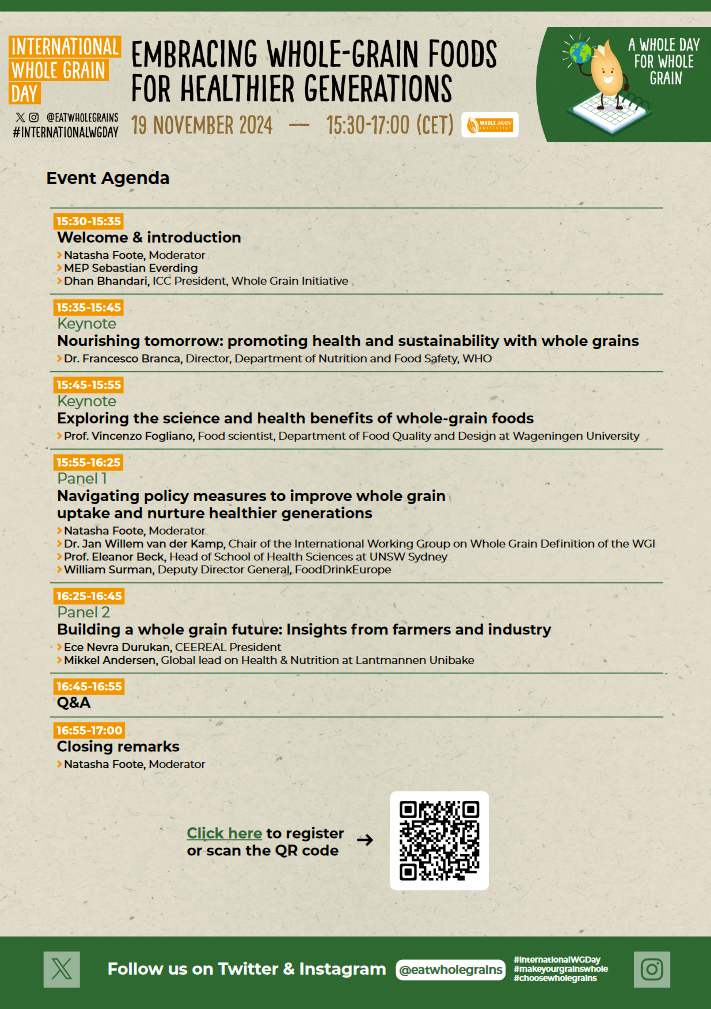On the 19th of November, the EU Parliament will host a special event to celebrate the 6th International Whole Grain Day. Hosted by MEP Sebastian Everding, this event will shine a spotlight on the essential role of whole grains in nurturing health across generations.
Organisations and experts will come together from around the world to highlight the vital contribution of whole grains to healthier, more sustainable diets. By bringing a range of diverse voices together, the event will champion whole grain consumption as a cornerstone of balanced nutrition.
Why whole grain matters?
Whole grains offer far more than just fiber. They are packed with essential nutrients that contribute to overall health and scientific evidence suggests that higher intakes of whole grain across all age groups are associated with a lower risk of being overweight or obese. Additionally, numerous observational studies consistently show that consuming more whole grains is linked to a lower risk of chronic diseases and mortality. Moreover, choosing whole grains over refined grains can have a positive impact on the environment, with recent data indicating that the conversion to whole grains can reduce environmental impact by 20%, simply by offering more nutrition in less volume than refined grains leading to less environmental impact.
Despite these remarkable benefits, the consumption of whole grain remains insufficient worldwide. Less than half of adults meet recommended daily intakes, and this number drops to less than 10% among children. This is where food industry plays a crucial role in extending the choices tailored for different age groups and consumer needs while enhancing the nutritional value of whole grains. In fact, processed whole grain products, such as bread or breakfast cereals, have been associated with a reduced risk of chronic diseases and all-cause mortality.
Cereal Partners Worldwide is championing healthier and sustainable diets
Encouraging the widespread consumption of whole grain products is of utmost importance for Cereal Partners Worldwide (CPW), maker of Nestle Breakfast Cereals and bars. Nestle Breakfast Cereals is at the forefront of facilitating higher whole grain intake shown by several dietary intake research from different parts of the world. They offer a diverse range of well-known brands and products which are tailored to meet consumers' preferences and dietary requirements while being convenient to integrate wholegrains into their daily diet. The data from dietary surveys in several countries show that breakfast cereals are a key contributor to whole grain intakes in the diets of children. Establishing good dietary habits from an early age like the inclusion of whole grain in the diet can have lifelong benefits.
In order to further promote the importance of whole grain for lifelong health, together with nutrition & health experts and industry associations, CPW is urging governments to recognize this crucial aspect and create an enabling regulatory landscape. This includes establishing a globally endorsed definition of whole grain foods and implementing policy actions such as front-of-pack labeling. By doing so, food industry, delivering the benefits of wholegrain into nutritious, safe and enjoyable products tailored for different age groups and consumer needs, could emphasize the positive impact of whole grain products on both health and the environment.
Leading by example, CPW has made it a priority to ensure that whole grain is the main ingredient in over 90% of their cereals by increasing the content gradually since 2003. Their green banner helps consumers easily identify breakfast cereals that deliver at least 8g of whole grain in every bowl. This commitment has not come without challenges, but through the collective efforts of CPW and its partners Nestle and General Mills, whole grain has become a part of everyday breakfast worldwide.
Whole grains aren’t just beneficial to our health; they’re also more environmentally sustainable than refined grains. By using whole grains, CPW manages to reduce waste in production and supports sustainable agriculture. CPW’s efforts to source grains locally in places like France, the UK, Australia and Poland further contribute to sustainability, reducing transportation emissions, and supporting local economies.
With continued commitment, they will advance their whole grain commitments through innovative new products and by driving education and policy changes through multistakeholder collaborations.
On the International Whole Grain Day, Cereal Partners Worldwide celebrates the achievements made and remain focused on the shared vision of a future where whole grains are a staple in every diet. By raising awareness, implementing key policy measures, and promoting industry initiatives, they aim to further enhance whole grain uptake and contribute to healthier dietary habits among young and older consumers.

Ece Nevra Durukan, Head of Nutrition, Regulatory and Scientific Affairs at Cereal Partners Worldwide
Ece Nevra Durukan, Head of Nutrition, Regulatory and Scientific Affairs at Cereal Partners Worldwide emphasizes, “With our continued commitment, we’ll keep advancing our contribution to whole grain intakes, both through innovative new products and by driving education and policy changes. Whether it’s through product development, marketing, research, or daily interactions with our consumers and partners, at CPW, each of us has a responsibility in creating a healthier, more sustainable breakfast table for millions.”
“Through public private partnerships, we can create a world where we have significantly eliminated the diet related health risks caused by low wholegrain intakes, where we have cultivated a sustainable legacy of improved health and wellbeing for our children and the generations to follow, by simply swapping the half of refined grains in our diet with wholegrain options.”
On International Whole Grain Day, once again, policy makers, nutrition and health experts, leading organizations, food industry, academia are coming together to discuss how to make every day a whole grain day—for individuals, consumers, and future generations.


